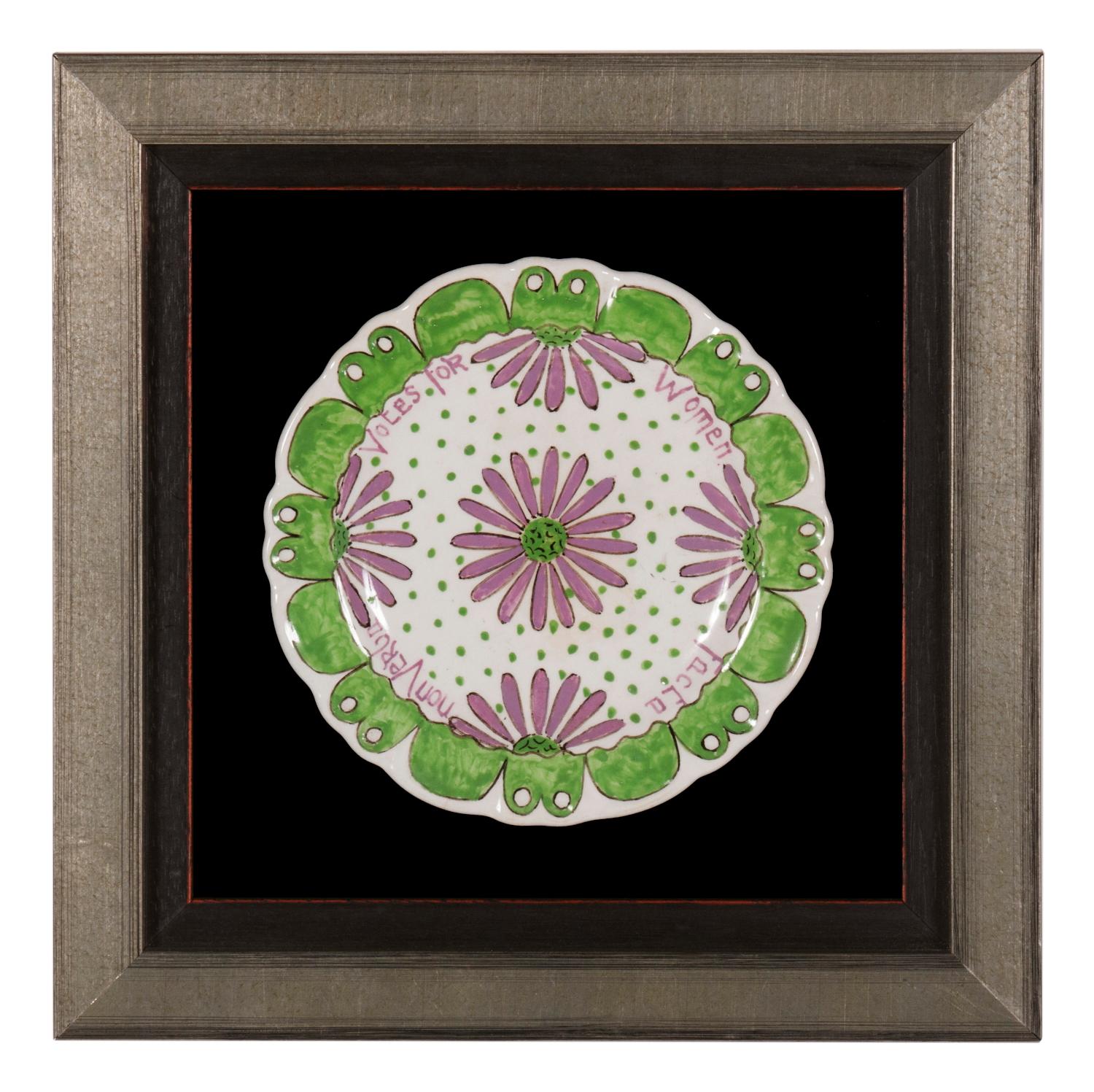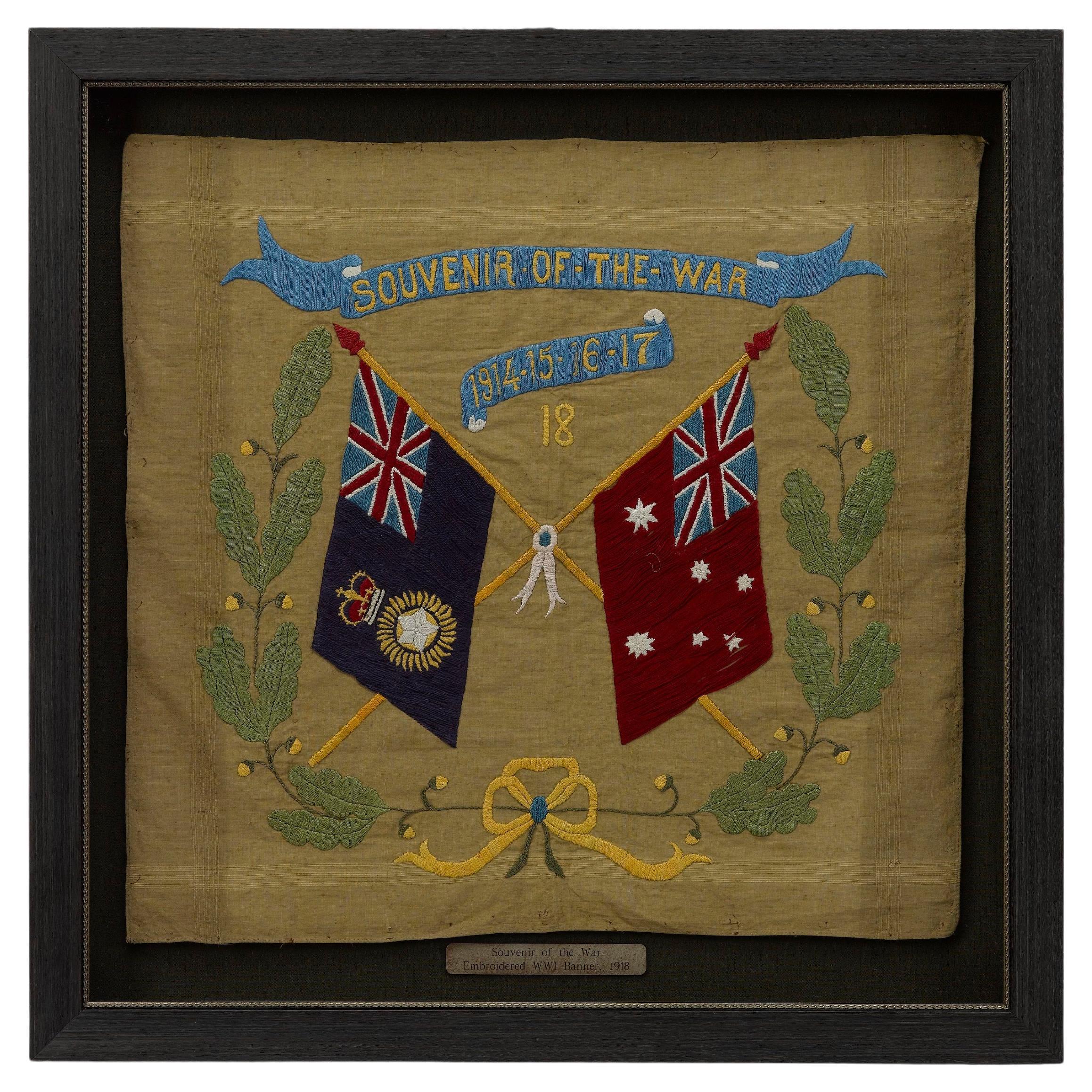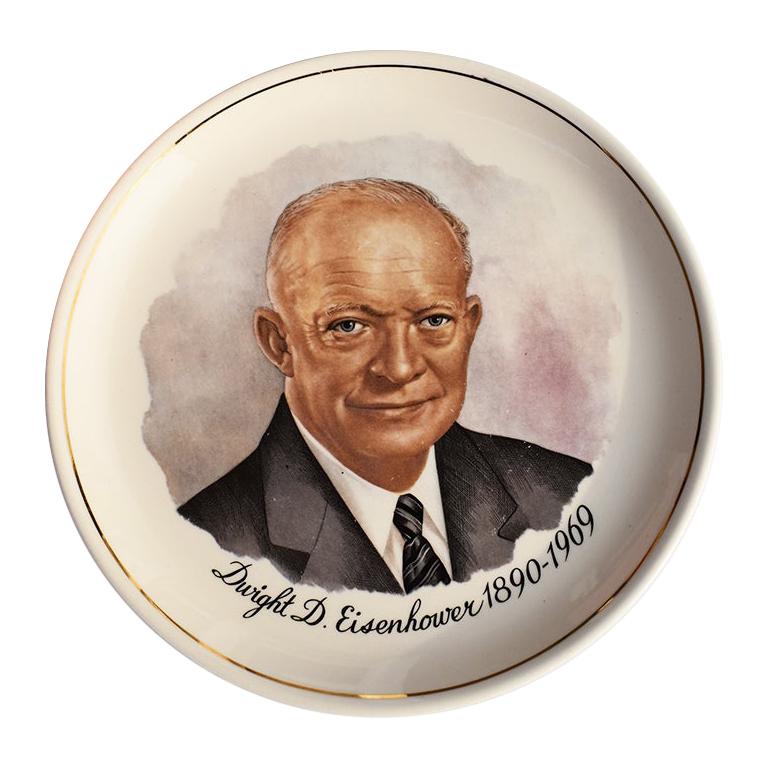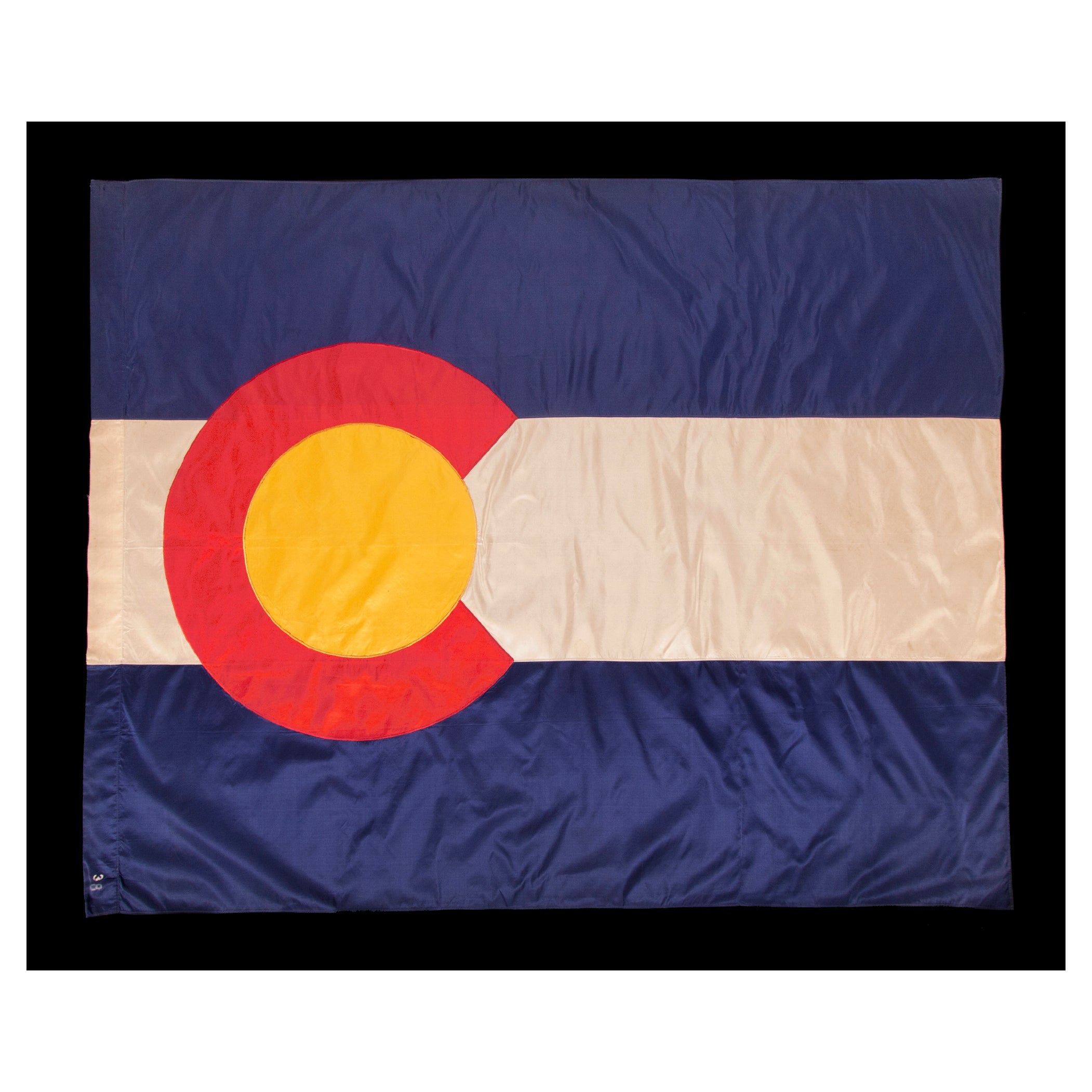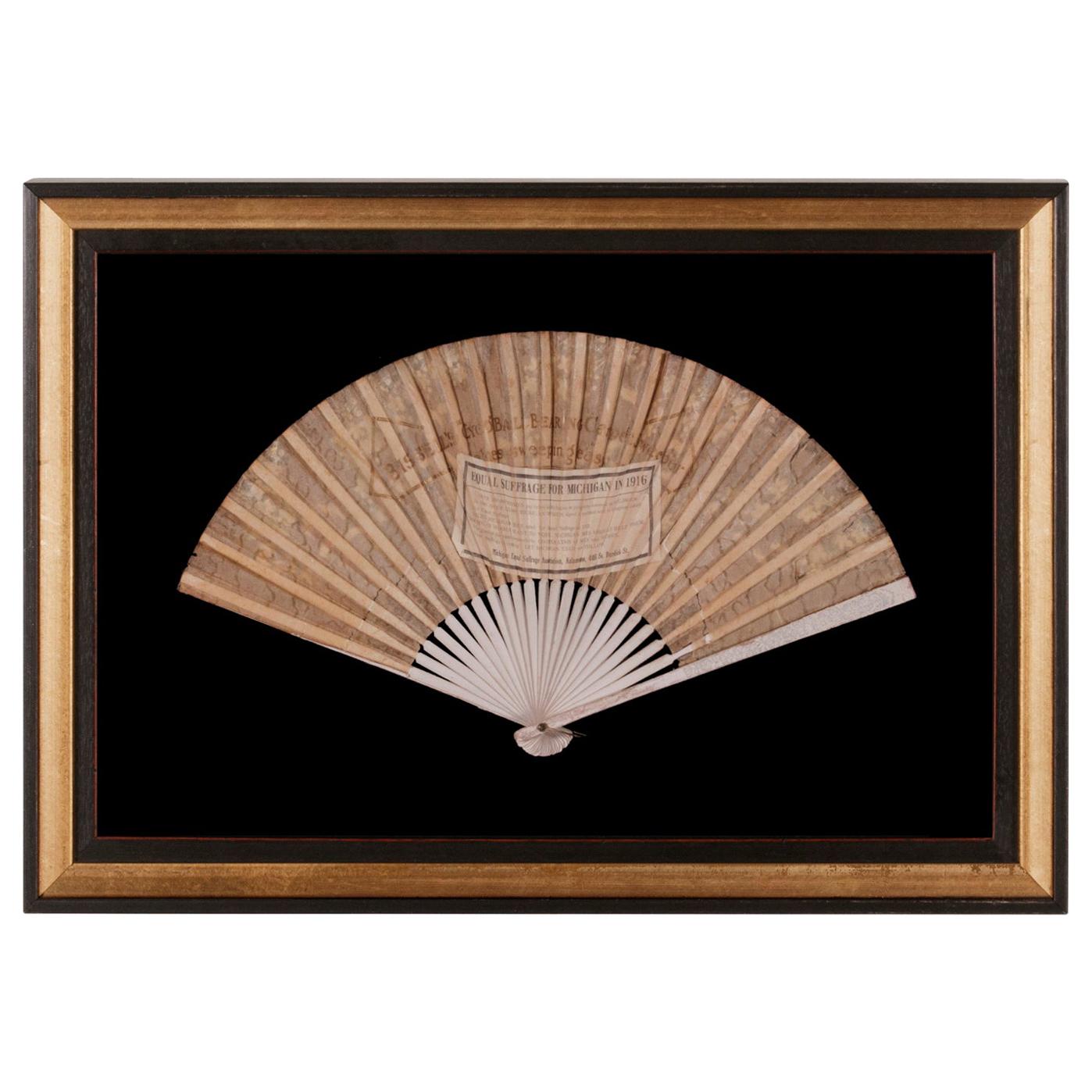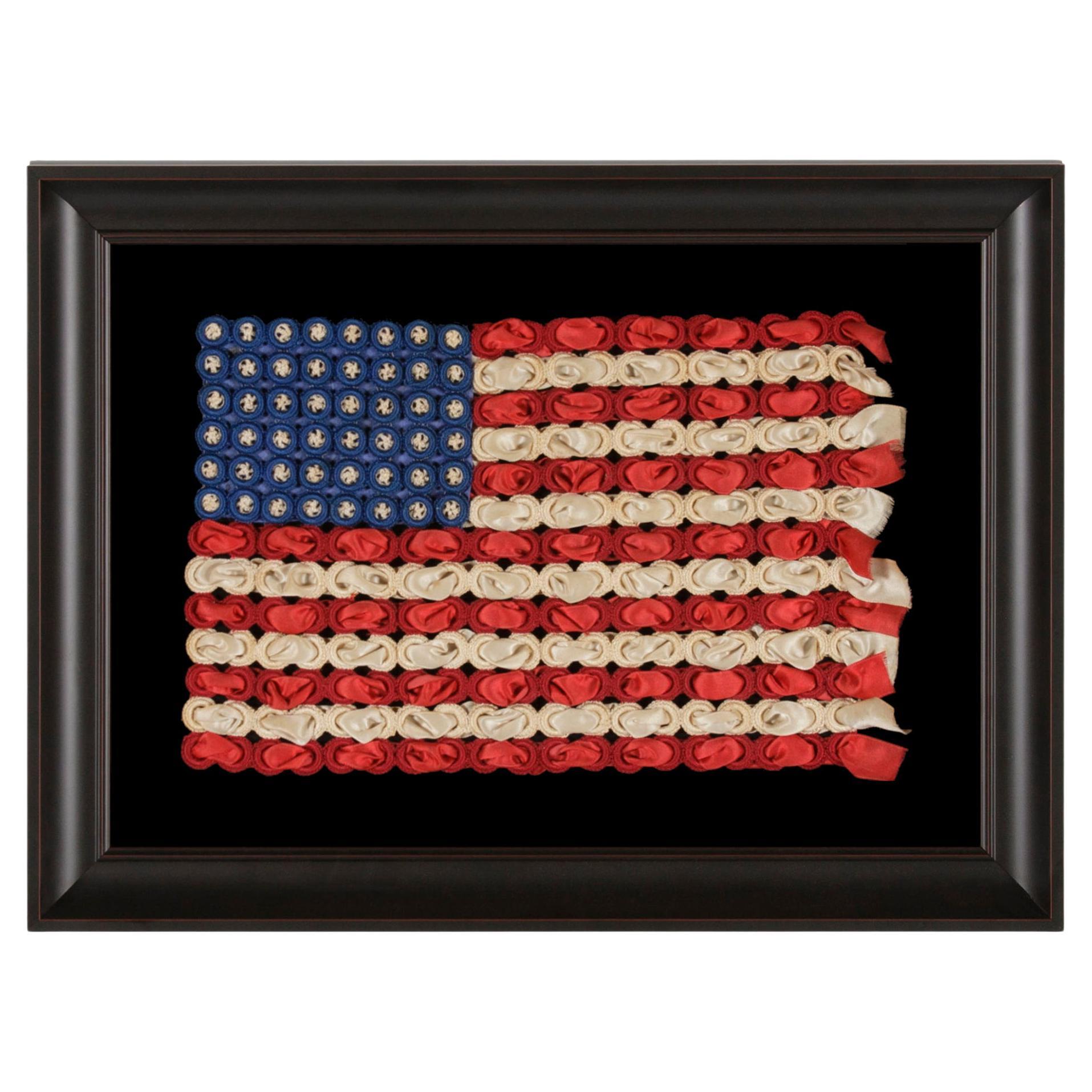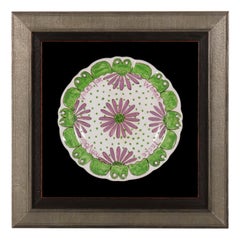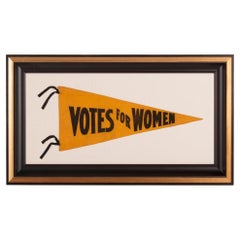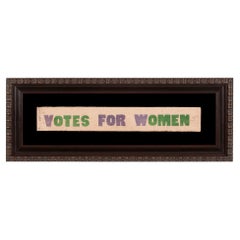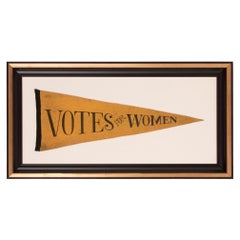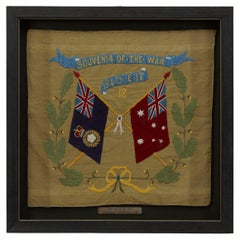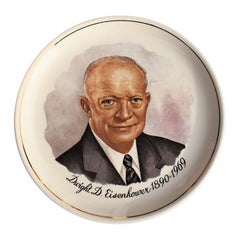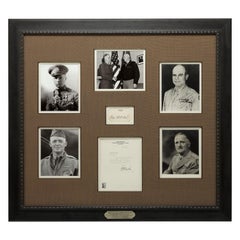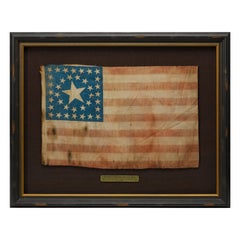Items Similar to Ironstone Suffragette Plate w/ Votes for Women Text, Made for Alva Belmont, 1914
Want more images or videos?
Request additional images or videos from the seller
1 of 7
Ironstone Suffragette Plate w/ Votes for Women Text, Made for Alva Belmont, 1914
About the Item
IRONSTONE PLATE WITH "VOTES FOR WOMEN" TEXT, MADE JOHN MADDOCK & SONS FOR SUFFRAGIST ALVA BELMONT FOR MARBLE HOUSE, HER FAMOUS ESTATE IN NEWPORT, RHODE ISLAND, CIRCA 1914:
Porcelain objects related to the Suffrage movement are extremely scarce. The most celebrated of all American suffrage dinnerware consists of a service of white ironstone, commissioned by Alva Belmont,* prominent Newport, Rhode Island, socialite. Belmont was the founder of a pro-suffrage group called the Political Equality Association. According to Suffrage memorabilia expert Ken Folley, "There are at least eight different examples known in this design, including a cup and saucer, a lunch or dinner plate, a salad or bread plate, a berry bowl, a soup bowl, a celery dish and a small creamer."** Some of these pieces were ordered by Belmont for events at her famous Newport estate, Marble House, beginning in 1909 and continuing through at least 1914. Others--the creamer in particular--are known to have been sold for fundraising efforts and were made available for purchase at her organization’s lunchroom, located at its headquarters in New York City.
The Political Equality Association lunchroom was especially popular. According to author Ina Bort, writing for the New York Historical Society, it was a place “where working-class women could purchase a nutritious meal for a little as five cents,” and where men were just as welcome as women. The establishment served as many as 115 men per day. Belmont opened 11 street level social clubs to serve the Suffrage movement. Bort explains that Suffrage china was also in use at another lunchroom, run by Mrs. Sophia Kramer, located at the 15th Assembly District Club house at 120 West 81st Street. “A 1911 article in The Flaming Sword,” says Bort, “described ‘[t]he more energetic women in New York,’ who ‘make of their [suffrage] cause a religion, and of their religion a business’—and a well-run, lucrative one at that—‘label their goods, and offer you votes for women glasses to drink from, votes for women dishes to eat from, votes for women table linen for breakfast, dinner, and supper.’ ” [Source: Bort, Ina. “Suffrage on the Menu, Part III: Alva’s Political Equality Association Lunchroom,” (07/18/17, New York Historical Society)
Ironstone china dating to 1909 appears to have been ordered from the English producer Minton, a well-known maker. More appears to have been ordered in 1914 , when Belmont hosted the Council of Great Women Conference in 1914 at Marble House, this time from another prolific English ironstone manufacturer, John Maddock & Sons. It was at this time that she also opened a China tea house on the grounds of Marble House and celebrated the return of her daughter, Consuelo, from the U.K..
This dinner plate, measuring 9 inches in diameter, was made by Maddock and is so marked on the reverse. It represents the largest of the ironstone objects that I know of with the “Votes for Women” slogan. Modern reproductions of the various pieces abound, not made by Minton or Maddock, and are available today. Originals are rare.
Provenance: Formerly in the Collection of Ken Folley.
Mounting: The plate was mounted in an archival fashion and placed in a black-painted and hand-gilded Italian molding. A shadow box was created to accommodate the depth of the object. The glass is conservation clear museum glass.
Condition: There are minor spots of discoloration and minor staining, but the overall condition is excellent.
* Alva Erskine Smith Vanderbilt Belmont, formerly married to William K. Vanderbilt, grandson of Cornelius Vanderbilt.
** Folley, Keneth, "Women’s Suffrage Memorabilia, An Illustrated Historical Study," (2013, McFarland & Company, Inc., Publishers, Jefferson, North Carolina), p. 68-71.
Frame size (H x L): Approx. 13" x 13"
Flag size (H x L): 9" diameter.
- Dimensions:Height: 13 in (33.02 cm)Width: 13 in (33.02 cm)Depth: 3 in (7.62 cm)
- Materials and Techniques:
- Place of Origin:
- Period:1910-1919
- Date of Manufacture:1914
- Condition:See Item Description.
- Seller Location:York County, PA
- Reference Number:Seller: ws-1061stDibs: LU849719902392
About the Seller
5.0
Recognized Seller
These prestigious sellers are industry leaders and represent the highest echelon for item quality and design.
Established in 1991
1stDibs seller since 2008
69 sales on 1stDibs
Typical response time: 1 to 2 days
- ShippingRetrieving quote...Shipping from: York County, PA
- Return Policy
Authenticity Guarantee
In the unlikely event there’s an issue with an item’s authenticity, contact us within 1 year for a full refund. DetailsMoney-Back Guarantee
If your item is not as described, is damaged in transit, or does not arrive, contact us within 7 days for a full refund. Details24-Hour Cancellation
You have a 24-hour grace period in which to reconsider your purchase, with no questions asked.Vetted Professional Sellers
Our world-class sellers must adhere to strict standards for service and quality, maintaining the integrity of our listings.Price-Match Guarantee
If you find that a seller listed the same item for a lower price elsewhere, we’ll match it.Trusted Global Delivery
Our best-in-class carrier network provides specialized shipping options worldwide, including custom delivery.More From This Seller
View AllSuffragette Plate, "Deeds Not Words" & "Votes for Women", The Only Known Example
Located in York County, PA
ENGLISH PORCELAIN SUFFRAGETTE PLATE WITH "DEEDS, NOT WORDS" AND "VOTES FOR WOMEN" SLOGANS, ONE-OF-A-KIND AMONG KNOWN EXAMPLES, CA 1905-1918
English porcelain plate, made for the Women's Suffrage movement in the U.K. One-of-a-kind among presently known examples, this wonderful Arts & Crafts design features a green, frog-like pattern around the border, surrounding violet and green or daisies, on a polka dot green background. Interspersed between the flowers are the words "Votes for Women" and, in Latin, the phrase "Facta non Verba...
Category
Early 20th Century English Political and Patriotic Memorabilia
Materials
Porcelain
Women's Suffrage Movement Pennant w/ Bold Color, Votes For Women Text, 1912-1919
Located in York County, PA
American Suffrage movement pennant, with a standard, triangular taper. Made of yellow felt, with tapered letters that read simply: "Votes for Women," bo...
Category
Early 20th Century American Political and Patriotic Memorabilia
Materials
Felt
Votes for Women Parade Textile in Purple and Gren
Located in York County, PA
VOTES FOR WOMEN PARADE TEXTILE IN PURPLE AND GREEN, OF A TYPE WORN AS SASHES AND WAVED AS NARROW PARADE BANNERS, MADE IN HARTFORD, CONNECTICUT BY CALHOUN PRESS FOR THE WOMEN'S POLITI...
Category
Early 20th Century American Political and Patriotic Memorabilia
Materials
Cotton
Price Upon Request
American Suffrage Movement 'Votes for Women" Pennant, circa 1912-1920
Located in York County, PA
AMERICAN SUFFRAGE MOVEMENT PENNANT WITH "VOTES FOR WOMEN" TEXT, IN A LARGE SIZE AND WITH ATTRACTIVE PATINA FROM AGE AND OBVIOUS USE, circa 1912-1920
American Suffrage movement penna...
Category
Early 20th Century American Political and Patriotic Memorabilia
Materials
Felt
Price Upon Request
Votes for Woman Parade Textile, Made in Hardford, CT, circa 1910-1915
Located in York County, PA
VOTES FOR WOMEN PARADE TEXTILE IN PURPLE AND GREEN, OF A TYPE WORN AS SASHES AND WAVED AS NARROW PARADE BANNERS, MADE IN HARTFORD, CONNECTICUT BY CALHOUN PRESS FOR THE WOMEN'S POLITI...
Category
Vintage 1910s American Political and Patriotic Memorabilia
Materials
Cotton
Price Upon Request
Colorado State Flag, Made of Silk, circa 1911-1920
Located in York County, PA
COLORADO STATE FLAG OF EXCEPTIONAL QUALITY, MADE OF SILK, CIRCA 1911-1920’s, EXTRAORDINARILY RARE IN THIS PERIOD AND THE EARLIEST EXAMPLE THAT I HAVE EVER ENCOUNTERED
Early state flags are few and far between. While I am asked for them constantly, most states did not actually have official flags until the 20th century.
On May 6th, 1911, Colorado became among the last to adopt a design. The project of doing so was spearheaded by the Denver Chapter of the Daughters of the American Revolution. The bill was introduced by Senator W.H. Sharply and adopted by the Eighteenth General Assembly. The artwork was the product of A.C. [Andrew Carlisle] Carson, President of the Ohio Society of Colorado. The meanings behind the elements in the design are as follows: The large letter "C" stands for Colorado and simultaneously for the Centennial State (Colorado entered the Union in 1876, the year in which our nation celebrated its 100th anniversary of independence), as well as the Columbine State (reflecting the state flower). The red color is included due to the fact that the word Colorado translates to scarlet or red in Spanish. The circle represents the sun, while the gold color symbolizes all-the-year sunshine, Colorado’s status as the greatest gold state, and one Columbine color. It was also included so that the Colorado state flag would have one more color than the U.S. flag. The color white reflects Colorado’s status as the greatest silver state, its eternal mountain snow, and one Columbine color. Lastly, the shade of Yale blue symbolizes all-the-year blue sky and one Columbine Color. Members of the D.A.R. were proud to note that this was also their color.
Made sometime between the initial year of the adoption of this design and the 1920’s, this particular flag is the earliest Colorado example that I have ever encountered. The blue and white bars, red “C,” and golden circle are a’’ made of silk taffeta. This was a costly fabric, reserved for the best material a flag-maker produced. The flag is constructed in the manner of a battle flag, to be carried on foot. Squarish in its overall profile, silk was the fabric of choice for flags employed in this function, due to the fact that it was light weight, and thus practical for hand-carrying, while simultaneously formal in appearance, appropriate for the sort of ceremonial use that military presentation often demands. The style of the hoist is also typical for field or parade use. Here the fabric was rolled over to form an open sleeve, through which a wooden staff could be inserted. The sleeve is lined on the interior with black cotton. Leather tabs, at the top and bottom, fit over metal posts on the staff, designed to accept them, to fix the flag in its proper position.
The bars were pieced and joined with lineal machine stitching. The hoist and fly ends were finished and hemmed by the same method. The devices are double-appliquéd (applied to both sides) with a machine buttonhole / blanket stitch. Though machines that produced buttonholes were, remarkably, available alongside the earliest standard machines, in the 1850’s and 60’s, the use of this sort of stitch in a running format, for appliqué work, remained highly unusual, even as late as the first half of the twentieth century, probably because it used a ton of thread when compared to the zigzag or satin stitch. It could be expected to appear more often in the hands of a maker of very fine flags, that employed embroidery machines and commissioned custom, fancy work of all sorts. Though unsigned—in no way uncommon in early examples, which were seldom signed—that is precisely the sort of firm that produced the Colorado flag...
Category
Early 20th Century American Political and Patriotic Memorabilia
Materials
Silk
Price Upon Request
You May Also Like
Souvenir of the War 1914-15-16-17-18 Banner
Located in Colorado Springs, CO
Presented is a stunning textile banner from the first World War, dating to 1918. The square tan cotton cloth is embroidered with two crossed flags, the ...
Category
Vintage 1910s Australian Political and Patriotic Memorabilia
Materials
Cotton
President Dwight D. Eisenhower Commemorative Ceramic Plate
Located in Oklahoma City, OK
A round ceramic commemorative plate of President Dwight Eisenhower. The plate is circular, with gold detail around the edges, and a portrait of Presi...
Category
20th Century North American American Classical Historical Memorabilia
Materials
Gold
$160 Sale Price
20% Off
Fathers of the Air Service Authentic Signature Collage, circa 1926-1993
Located in Colorado Springs, CO
Presented is a collage celebrating the men who made an early impact on the formation of America’s Air Service. Complete with signatures by Jimmy Doolittle, Tooey Spaatz, Hap Arnold, ...
Category
Late 20th Century American Historical Memorabilia
Materials
Paper
38-Star Antique American Flag with Unique Canton, circa 1876-1890
Located in Colorado Springs, CO
This is a striking 38-star American flag. The flag dates to 1876-1890, when Colorado (represented by the large star in the center of the flag’s canton) joined the Union as the 38th s...
Category
Antique Late 19th Century American Political and Patriotic Memorabilia
Materials
Muslin
Antique 13-Star Patriotic Sash by Louis E. Stilz & Bros., Late 19th Century
Located in Colorado Springs, CO
Presented is an original patriotic sash from the late 19th century, featuring 13 stars against a bright blue field. This sash features appliqued silver stars on a blue canton, red an...
Category
Antique Late 19th Century American Historical Memorabilia
Materials
Cotton
John F. Kennedy Signed Senate Menu Collage
Located in Colorado Springs, CO
Presented is a John F. Kennedy inscribed and autographed United States Senate Restaurant menu. Kennedy signed the menu on April 10, 1957, when he was a Senator representing the state of Massachusetts...
Category
Vintage 1950s American Historical Memorabilia
Materials
Paper
$8,160 Sale Price
20% Off
Recently Viewed
View AllMore Ways To Browse
Framed China Plate
1910 Stained Glass
Berry Bowl
English Ironstone
Antique English Ironstone
Ironstone Rare
Hand Painted Salad Plates
White Ironstone
Antique Berry Bowl
England Creamers
China Dinner Service
White Breakfast Table
Gilded Dinner Plates
Antique Conference Tables
Antique Minton China
Italian Dinner Service
Porcelain China Dinner Service
Sword Table
